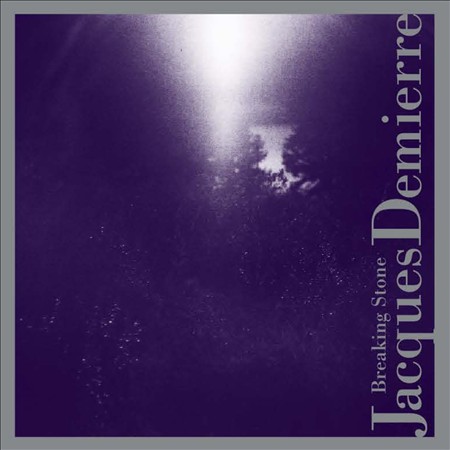BREAKING STONE
Jacques Demierre
composition piano voix
« […] Blending Swiss traditions and sensibilities with avant garde Jazz, classical, improvised music and the American experimentalist tradition, Jacques Demierre has created a unique and striking sound world that challenges the idea of language itself.
Breaking Stone pits sound poetry against a Cagean tapestry of piano sounds in one of the strangest “song cycles” you are ever likely to hear. The meditative and ambient sounds of harmonics in Sumpatheia, scored for acoustic guitar and violin recall the distant sounds of Swiss mountain Alp horns. Exhilaratingand dramatic, the Three Pieces for Player Piano push the limits of the instrument and the player to new heights. […] »
On TZADIK Records, Composer Series, John Zorn’s label, dedicated to releasing the best in avant-garde and experimental music.
BREAKING STONE
format: CD
1-3. THREE PIECES FOR PLAYER PIANO 08:49
4. SUMPATHEIA 10:41, for violin and guitar – Denitza Kazakova, vln, Jean-Christophe Ducret, guit
5. BREAKING STONE 40:00, for piano and voice
recorded April 12, 2011 by Alex Inglizian at Experimental Sound Studio, Chicago
mixed by Adrien Kessler at Vélodrome Studio, Geneva, Switzerland
pre-mastered by Blaise Favre at Vietnet Studio, Yverdon-les-Bains, Switzerland
mastered by Scott Hull, February 4, 2013, New York
On TZADIK, Composer Series, TZ 9001
three pieces for player piano iii strip
sumpatheia
breaking stone
With Breaking Stone, Jacques Demierre carries on his music and language research, through concerted hammer strokes and interjections. His voice amplified and diffused through the body of the piano, he utters a text of his own composition inspired by a previous work performed with Vincent Barras on the writings of the great linguist Ferdinand de Saussure. And suddenly the piano is transformed into an operating room: the voice is modified, sometimes even constrained by the pianist’s playing. The relation between voice and piano has never been so harsh, composing a vocabulary of sounds extracted from a patient that has come to get his silence treated by a doctor-exorcist: Jacques Demierre plays both roles.
With a decisive stroke to the right key he conjures a thousand languages—heard in how many other lives?—fashioning formulas which summon dexterity and compassion; hitting a pleading chord he yields onomatopoeia and punctuation. Ordering pauses to rest and gather his spirits, he discovers ways for his instruments to speak other than by note or by word. And always, this question: Is it the piano that reacts to the diction or the voice that complies?
Though he leaves us without answer, Jacques Demierre has certainly delivered himself of the silence that was weighing on him. In the wild child’s crib he has made of the piano, we find now elements of a hidden language. These send us back to speech’s most ancient experiments, like sonorities of instruments that one would think had only just been invented, and that go by the names of voice and piano.
Guillaume Belhomme
Avec Breaking Stone, le musicien et linguiste poursuit ses recherches, mais cette fois à coups de marteaux et d’interjections agissant de concert. Voix amplifiée et diffusée dans le corps du piano, il dit un texte de sa composition que lui inspira un précédent travail mené avec Vincent Barras sur les écrits du linguiste de référence Ferdinand de Saussure. Et voici le piano changé en salle d’opération : la voix y est modifiée, parfois même contrainte par le jeu du pianiste. Le rapport piano-voix n’a jamais été aussi âpre, qui fait son vocabulaire des sons arrachés à un patient venu guérir son silence par un médecin qui tient de l’exorciste – Jacques Demierre jouant l’un et l’autre rôle.
Frappant sec une touche qui fera effet, il convoque mille langues – dans quelles autres vie entendues ? – pour confectionner des formules qui invoquent doigté et compassion ; provoquant une corde sensible, il obtient onomatopées et ponctuation ; commandant des pauses où respirer et reprendre ses esprits, il découvre pour ses instruments d’autres moyens de dire que par la note et par le mot. Et toujours, cette question : est-ce le piano qui réagit sous la dictée ou la voix qui obtempère?
S’il nous laisse sans réponse, Jacques Demierre s’est bel et bien déchargé du silence qui lui pesait. Dans le piano qu’il a changé en berceau d’enfant sauvage, on trouve maintenant des éléments d’un langage enfoui qui renvoient aux plus anciennes expérimentations qu’ait connues la parole comme des sonorités d’instruments qu’on croirait tout juste inventés, qui ont pour noms voix et piano.
Guillaume Belhomme


